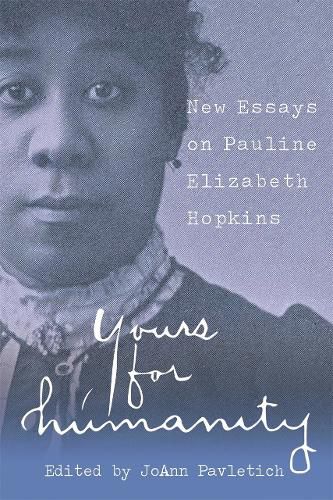Readings Newsletter
Become a Readings Member to make your shopping experience even easier.
Sign in or sign up for free!
You’re not far away from qualifying for FREE standard shipping within Australia
You’ve qualified for FREE standard shipping within Australia
The cart is loading…






Pauline Elizabeth Hopkins (1859-1930), African American novelist, editor, journalist, playwright, historian, and public intellectual, used fiction to explore and intervene in the social, racial, and political challenges of her era. Her particular form of cultural activism was groundbreaking for its time and continues to influence and inspire authors and scholars today. This collection of essays constitutes a new phase in the full historical and literary recovery of her work.
JoAnn Pavletich argues that considered from the broadest of perspectives, Hopkins’s life work occupies itself with the critique and creation of epistemologies that control racialized knowledge and experience. Whether in representations of a critical contemporary problem such as lynching, imperialism, or pan-African unity or in representations of African American women’s voices, Hopkins’s texts create new knowledge and new frames for understanding it. The essays in this collection engage this knowledge, articulating nuanced understandings of Hopkins’s era and her innovative writing practices, opening new doors for the next generation of Hopkins scholarship. With contributions from well-established Hopkins scholars such as John Gruesser (editor of The Unruly Voice) and Hanna Wallinger (author of Pauline E. Hopkins: A Literary Biography), the collection also includes important new scholars on Hopkins such as Elizabeth Cali, Edlie Wong, and others.
$9.00 standard shipping within Australia
FREE standard shipping within Australia for orders over $100.00
Express & International shipping calculated at checkout
Pauline Elizabeth Hopkins (1859-1930), African American novelist, editor, journalist, playwright, historian, and public intellectual, used fiction to explore and intervene in the social, racial, and political challenges of her era. Her particular form of cultural activism was groundbreaking for its time and continues to influence and inspire authors and scholars today. This collection of essays constitutes a new phase in the full historical and literary recovery of her work.
JoAnn Pavletich argues that considered from the broadest of perspectives, Hopkins’s life work occupies itself with the critique and creation of epistemologies that control racialized knowledge and experience. Whether in representations of a critical contemporary problem such as lynching, imperialism, or pan-African unity or in representations of African American women’s voices, Hopkins’s texts create new knowledge and new frames for understanding it. The essays in this collection engage this knowledge, articulating nuanced understandings of Hopkins’s era and her innovative writing practices, opening new doors for the next generation of Hopkins scholarship. With contributions from well-established Hopkins scholars such as John Gruesser (editor of The Unruly Voice) and Hanna Wallinger (author of Pauline E. Hopkins: A Literary Biography), the collection also includes important new scholars on Hopkins such as Elizabeth Cali, Edlie Wong, and others.